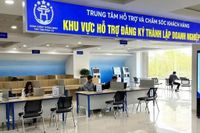In a bid to bolster its economy and enhance the business landscape, Hanoi has set ambitious goals for 2025, aiming to register an additional 30,000 new businesses. This initiative comes as the capital city grapples with a challenging economic environment, marked by an increasing number of business dissolutions and temporary closures.
As of the end of 2024, Hanoi boasted over 400,000 registered businesses, with around 220,000 actively operating. Impressively, small and medium-sized enterprises (SMEs) account for 98.2% of this figure, providing jobs for 55.1% of the workforce and contributing over 40% to the city’s GDP. However, the business ecosystem faces hurdles, including a decline in new registrations in 2025 and ongoing operational difficulties.
To address these challenges, the Hanoi People's Committee has launched a detailed plan under the directive of the Prime Minister, aiming for an economic growth rate of 8% in 2025, with aspirations for double-digit growth in subsequent years. The plan outlines specific responsibilities for various departments and agencies, emphasizing a clear division of tasks and accountability.
“We need to prioritize the needs of our citizens and businesses. Their challenges must be our challenges,” said Chairman Trần Sỹ Thanh of the Hanoi People’s Committee, emphasizing a collaborative approach to overcoming obstacles.
One of the key strategies involves streamlining administrative procedures. The city aims to reduce processing times for these procedures by at least 30% and cut compliance costs for businesses by a similar margin. Additionally, there are plans to eliminate at least 30% of unnecessary business conditions, transitioning from a pre-approval system to a post-approval oversight model.
Hanoi is also focusing on innovation, with a target of over 50% of enterprises expected to engage in innovative practices by 2025. The city plans to attract 20-25 businesses to develop approximately 30-35 products recognized as key industrial outputs, including 10-15 products gaining recognition for the first time.
Moreover, the city is setting its sights on increasing total retail sales of goods and services by 9-10%. In terms of employment, Hanoi aims to create jobs for 167,000 individuals in 2025 and reduce the urban unemployment rate to below 3%. The city also targets a workforce training rate of 75%, with 55% of workers holding degrees or certificates.
In addition to these economic targets, the city plans to achieve a disbursement rate of over 95% for its public investment capital plan for 2025. This comprehensive approach is designed to foster a more resilient and dynamic business environment.
On another front, discussions surrounding proposed amendments to business regulations are gaining traction. Lawmakers are addressing the issue of false declarations of charter capital, which has been a growing concern in the business community. A representative has suggested enhancing the draft law to include provisions for handling violations related to false capital declarations.
“The inclusion of a clear mechanism for addressing these violations is essential to protect the integrity of our business registration system,” the representative stated, advocating for the assignment of business registration and tax authorities the power to request proof of capital contributions.
In the realm of legal statuses for enterprises, a new list has been proposed, detailing seven potential statuses, including temporary business suspension, inactivity at the registered address, and bankruptcy. The representative emphasized the importance of public transparency regarding these statuses, proposing that information should be updated on the national business registration information system.
“Public access to this information will allow stakeholders to make informed decisions and foster a more trustworthy business environment,” the representative added.
Furthermore, there is a push to clarify the responsibilities of enterprises concerning the disclosure of beneficial owners. While the draft law supports this initiative, suggestions have been made to specify the form of storage, minimum duration, and penalties for non-compliance.
As part of the ongoing reforms, the requirement for individuals registering to establish a business to submit a criminal record has been removed, a move seen as a step towards administrative simplification. However, concerns have been raised regarding the potential for management gaps, particularly with the rise of 'ghost enterprises.'
To mitigate these risks, it has been proposed that business registration agencies should have the authority to verify criminal records through a connection with the national database on citizen identification and criminal records. This would ensure that while administrative processes are streamlined, the integrity of business registrations is maintained.
Additionally, the rights of public university employees to invest in, manage, and operate science and technology enterprises are being institutionalized. This aligns with the government's focus on promoting innovation and research commercialization.
“This is a crucial step in harnessing academic research for practical applications in the marketplace,” commented the representative, who also called for specific conditions to avoid conflicts of interest in such arrangements.
Overall, Hanoi's proactive stance on business development and regulatory reform reflects a commitment to fostering a vibrant economic landscape. The city’s plans and proposed amendments aim not only to stimulate growth but also to ensure that the business environment remains transparent and accountable.
With these initiatives, Hanoi is poised to navigate the complexities of modern business challenges while striving to create a more robust and inclusive economy.

